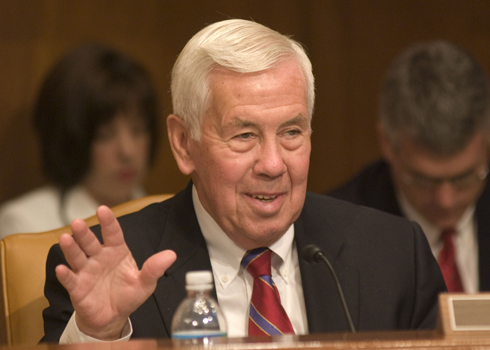Sen. Dick Lugar (R-IN), the ranking member of the Senate Foreign Relations Committee, urged the Obama administration to significantly scale back U.S. resources and military commitment in Afghanistan given the bleak chances for establishing a flourishing, stable democracy there any time soon.
“It’s exceedingly difficult to conclude that our vast expenditures in Afghanistan represent a rational” strategy, Lugar said during opening remarks at a Tuesday hearing on the future of Afghanistan.
Osama bin Laden’s killing does not change the dynamic in Afghanistan, which is still plagued by corruption, a weak central government, tribal skirmishes and a Taliban presence that is unlikely to diminish in the near future, Lugar said.
Even though the U.S. has seen little progress in standing up a stable democracy and eradicating the Taliban in the last decade, the U.S. government will pour more than $120 billion into Afghanistan in the next fiscal year during a time of deepening debt and fiscal woes at home.
Homeland Security Secretary Janet Napolitano and others have said Yemen poses more of a terrorism threat than Afghanistan, yet the U.S. is spending a pittance to combat it there compared to Afghanistan, Lugar continued.
While not calling for a complete withdrawal of U.S. military and civilian presence in Afghanistan, Lugar called on President Obama to define what success in Afghanistan will entail, what metrics will be used to determine the extent of any future commitment.
Richard Haas, president of the Council of Foreign Relations, told the committee he is “deeply and profoundly” skeptical of America’s ability to make sustained progress in Afghanistan when neighboring Pakistan continues to harbor Taliban and al Qaeda.
“Afghanistan is a strategic distraction — pure and simple,” he said.
Sen. John Kerry (D-MA), who chairs the the Foreign Relations panel, was far more open-ended in his statements.
“Despite the tremendous skill and sacrifice of or troops,” Kerry said, many believe “there is no military victory to be had in Afghanistan. …If that is true then we need to fashion the political resolution.”
Other witnesses urged a more cautious drawing down of the U.S commitment. Ambassador Ronald Neumann, president of the American Academy of Diplomacy, said the U.S. must not allow the Taliban to take control of the Afghanistan government.
“We need to make sure we don’t destroy our chances for success by moving out very quickly,” he said. “We should be looking for ways to spend less, but I think we have to try to turn over to the Afghans at a realistic pace. We are only now at a point where we’re trying to do it…I think we need to see if it works.”
Dr. Anne-Marie Slaughter, professor of politics and international affairs at Princeton University, also urged the U.S. to continue it’s military presence there until we can be reasonably certain the Taliban is not harboring al Qaeda terrorists.
Kerry said he would travel to Afghanistan on the weekend of May 14 to meet with President Karzai to assess the situation. The hearing was scheduled before bin Laden’s death in an ongoing attempt to assess the appropriate level of U.S. military withdrawal ahead of a July deadline.









